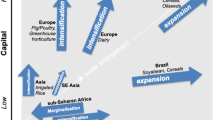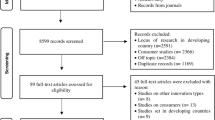Abstract
The number of sustainability assessment tools in agriculture has been increasing rapidly. However, a common understanding of what should be assessed as sustainability or as a sustainable state of agriculture is still lacking, in particular for the social dimension. We performed a qualitative content analysis of 87 farm-related sustainability assessment tools to examine how these tools defined and operationalized the social dimension of sustainability. We further analysed a subset of tools on the used indicators. The results clearly showed that as the backgrounds and objectives of the tools differed, so did their understanding of which contents should be integrated into the social dimension and how the topics of the social dimension should be operationalized. As the geographical ranges of application varied, so did the perceptions of which standard should be utilized to evaluate what social sustainability means on a farm. Production systems differ strongly over the globe. Tools therefore often neglect to define social sustainability and lack stringent operationalization. Two major inconsistencies could be seen in the scope that was covered by the tools and the sustainability standard: Whereas, for example, some tools base their sustainability assessments on human rights and working rights according to the United Nations and International Labour Organization conventions, others assess farmer perceptions of life quality. Although recurring topics such as labour conditions, life quality and societal impacts were identified, a need exists to take a step back and clearly frame social sustainability in agriculture from a conceptual perspective.





Similar content being viewed by others
Notes
Forty-nine indicator sets considered some kinds of impact on the local community, 6 consumers and 2 educational effects for society.
References
Anderson, M. W., Teisl, M. F., & Noblet, C. L. (2016). Whose values count: Is a theory of social choice for sustainability science possible? Sustainability Science,11, 373–383.
Becker, E., Jahn, T., & Stieß, I. (1999). Exploring uncommon ground: Sustainability and the social sciences. In E. Becker & T. Jahn (Eds.), Sustainability and the social sciences. A cross-disciplinary approach to integrating environmental considerations into theoretical reorientation (pp. 1–22). London: ZED Books.
Binder, C. R., & Feola, G. (2013). Normative, systemic and procedural aspects: A review of indicator-based sustainability assessments in agriculture. In A. A. Marta-Costa & E. L. D. G. Soares da Silva (Eds.), Methods and procedures for building sustainable farming systems (pp. 33–46). Dordrecht: Springer.
Binder, C. R., Feola, G., & Steinberger, J. K. (2010). Considering the normative, systemic and procedural dimensions in indicator-based sustainability assessments in agriculture. Environmental Impact Assessment Review,80, 71–81.
Bockstaller, C., Feschet, P., & Angevin, F. (2015). Issues in evaluating sustainability of farming systems with indicators. Oliseeds & fats Crops & lipids,22(1), D102.
Bond, A., Morrison-Saunders, A., & Pope, J. (2012). Sustainability assessment: The state of the art. Impact Assessment and Project Appraisal,30(1), 53–62.
Boström, M. (2012). A missing pillar? Challenges in theorizing and practicing social sustainability: Introduction to the special issue. Sustainability: Science, Practice, & Policy,8(1), 3–12.
Bourdieu, P. (1986). The forms of capital. In J. E. Richardson (Ed.), Handbook of theory of research for the sociology of education (pp. 241–258). Westport: Greenwood Press.
Colantonio, A. (2007). Social sustainability: An exploratory analysis of its definition, assessment methods, metrics and tools. In EIBURS working paper series, measuring social sustainability: Best practice from Urban renewal in the EU 1. Oxford: Oxford Brookes University.
Coteur, I., Marchand, F., Debruyne, L., Bijttebier, J., Triste, L., & Lauwers, L. (2014). Development and evaluation of an on-demand sustainability tool in Flanders. In Farming systems facing global challenges: Capacities and strategies: Proceedings of the 11th European IFSA symposium, international farming systems association (IFSA) Europe (pp. 38–48). Müncheberg, Berlin: Leibniz-Centre for Agricultural Landscape Research (ZALF), Humboldt-Universität zu Berlin.
De Olde, E. M., Moller, H., Marchand, F., McDowell, R. W., MacLeod, C., et al. (2017). When experts disagree: The need to rethink indicator selection for assessing sustainability of agriculture. Environment, Development and Sustainability,19, 1327–1342.
De Olde, E. M., Oudshoorn, F. W., Sørensen, C. A. G., Bokkers, E. A. M., & de Boer, I. J. M. (2016). Assessing sustainability at farm-level: Lessons learned from a comparison of tools in practice. Ecological Indicators,66, 391–404.
Dempsey, N., Bramley, G., Power, S., & Brown, C. (2010). The social dimension of sustainable development: Defining urban social sustainability. Sustainable Development,19(5), 289–300.
Diaz-Balteiro, L., González-Pachón, J., & Romero, C. (2016). Measuring systems sustainability with multi-criteria methods: A critical review. European Journal of Operational Research,258(2), 1–10.
Diener, E., Napa Scollon, C., & Lucas, R. E. (2003). The evolving concept of subjective well-being: The multifaceted nature of happiness. Advances in Cell Aging and Gerontology,15, 187–219.
Dijk, M., de Kraker, J., van Zeijl-Rozema, A., van Lente, H., Beumer, C., Beemsterboer, S., et al. (2017). Sustainability assessment as problem structuring: Three typical ways. Sustainability Science,12, 305–317.
Dong, F., Mitchell, P. D., Knuteson, D., Wyman, J., Bussan, A. J., & Conley, S. (2015). Assessing sustainability and improvements in US Midwestern soybean production systems using a PCA–DEA approach. Renewable Agriculture and Food Systems,31(6), 524–539.
Eizenberg, E., & Jabareen, Y. (2017). Social sustainability: A new conceptual framework. Sustainability,9(68), 1–16.
FAO (Ed.). (2014). SAFA sustainability assessment of food and agricultural systems guidelines (3rd ed.). Rome: Food and Agriculture Organization of the United Nations.
Gasparatos, A., & Scolobig, A. (2012). Choosing the most appropriate sustainability assessment tool. Ecological Economics,80, 1–7.
Gerrard, C., Smith, L., Padel, S., Pearce, B., Hitchings, R., Measures, M., et al. (2011). OCIS public goods tool development. Berkshire: Organic Research Centre.
Giddings, B., Hopwood, B., & O’Brien, G. (2002). Environment, economy and society: Fitting them together into sustainable development. Sustainable Development,10, 187–196.
Habermas, J. (1988). Der philosophische Diskurs der Moderne: Zwölf Vorlesungen (12th ed.). Frankfurt: Suhrkamp.
Hayati, D., Ranjbar, Z., & Karam, E. (2010). Measuring agricultural sustainability. Sustainable Agriculture Reviews,5, 73–100.
Hugé, J., Waas, T., Dahdouh-Guebas, F., Koedam, N., & Block, T. (2013). A discourse-analytical perspective on sustainability assessment: Interpreting sustainable development in practice. Sustainability Science,8, 187–198.
ILO (Ed.). (1998). Declaration on fundamental principles and rights at work. Geneva: International Labour Organization.
Kajikawa, Y. (2008). Research core and framework of sustainability science. Sustainability Science,3, 215–239.
Kaur, A., & Sharma, P. C. (2017). Social sustainability in supply chain decisions: Indian manufacturers. Environment, Development and Sustainability. https://doi.org/10.1007/s10668-017-9961-5.
Lemke, N. (2016). Sustainability assessment of agricultural systems—Applicability testing in the Schorfheide-Chorin Biosphere Reserve, Germany. Master thesis. Berlin: Humboldt-University.
Littig, B., & Grießler, E. (2005). Social sustainability: A catchword between political pragmatism and social theory. International Journal of Sustainable Development,8(1/2), 65–79.
López-Ridaura, S., van Keulen, H., van Ittersum, M. K., & Leffelaar, P. A. (2005). Multiscale methodological framework to derive criteria and indicators doe sustainability evaluation of peasant natural resource management systems. Environment, Development and Sustainability,7, 51–69.
Magee, L., Scerri, A., James, P., Thom, J. A., Padgham, L., et al. (2013). Reframing social sustainability reporting: Towards an engaged approach. Environment, Development and Sustainability,15, 225–243.
Marchand, F., Debruyne, L., & Lauwers, L. (2012). A comparison of complex expert-based assessment versus quickscan assessment. In: Proceedings of the 10th IFSA symposium: Producing and reproducing farming systems. New modes of organization for sustainable food systems of tomorrow. Aarhus: International Farming System Association.
Marchand, F., Debruyne, L., Triste, L., Gerrard, C., Padel, S., & Lauwer, L. (2014). Key characteristics for tool choice in indicator-based sustainability assessment at farm level. Ecology and Society,19(3), 46. (Special Feature).
Mayring, P. (2010). Qualitative Inhaltsanalyse. In G. Mey & K. Mruck (Eds.), Handbuch Qualitative Forschung in der Psychologie (pp. 601–613). Wiesbaden: Springer.
McKenzie, S. (2004). Social sustainability: Towards some definitions. Hawke Research Institute Working Paper Series, 27. Adelaide: University of South Australia.
Migliorini, P. (2013). The sustainability assessment of agro-food systems and diets. The comparison of IFOAM vs Slow Food Networks. Lyon: SARA-Lyon.
Murphy, K. (2012). The social pillar of sustainable development: A literature review and framework for policy analysis. Sustainability: Science, Practice, & Policy,8(1), 15–29.
Ness, B., Urbel-Piirsalu, E., Anderberg, S., & Olsson, L. (2007). Categorising tools for sustainability assessment. Ecological Economics,60, 498–508.
Omann, I., & Spangenberg, J. H. (2002). Assessing social sustainability. The social dimension of sustainability in a socio-economic scenario. In 7th Biennial conference of the international society for ecological economics. Sousse: International Society for Ecological Economics.
Pacini, C., Lazzerini, G., Migliorini, P., & Vazzana, C. (2009). An indicator-based framework to evaluate sustainability of farming systems: Review of applications in Tuscany. Italian Journal of Agronomy,1, 23–39.
Padel, S., Gerrard, C., Smith, L., Schader, C., Baumgart, L., Stolze, M., & Pearce, B. (2015). Further development of methodologies for sustainability assessment and monitoring in organic/ecological agriculture. Final project report, Berkshire & Frick: ORC & FiBL.
Pelzer, E., Fortino, G., Bockstaller, C., Angevin, F., Lamine, C., Moonen, C., et al. (2012). Assessing innovative cropping systems with DEXiPM, a qualitative multi-criteria assessment tool derived from DEXi. Ecological Indicators,18, 171–182.
Putnam, R. D. (1995). Bowling alone: America’s declining social capital. Journal of Democracy,6, 65–78.
Ryff, C. D. (1989). Happiness is everything, or is it? Explorations on the meaning of psychological well-being. Journal of Personality and Social Psychology,57(6), 1069–1081.
Salas-Zapata, W. A., Ríos-Osorio, L. A., & Cardona-Arias, J. A. (2017). Methodological characteristics of sustainability science: A systematic review. Environment, Development and Sustainability,19, 1127–1140.
Schader, C., Grenz, J., Meier, M. S., & Stolze, M. (2014). Scope and precision of sustainability assessment approaches to food systems. Ecology and Society,19(3), 42.
Schindler, J., Graef, F., & König, H. J. (2015). Methods to assess farming sustainability in developing countries. A review. Agronomy for Sustainable Development,35(3), 1043–1057.
Sheate, W. (Ed.). (2010). Tools, techniques and approaches for sustainability: Collected writings in environmental assessment policy and management. Singapore: World Scientific Publishing.
Shreck, A., Getz, C., & Feenstra, G. (2006). Social sustainability, farm labor, and organic agriculture: Findings from an exploratory analysis. Agriculture and Human Values,23, 439–449.
Spangenberg, J., & Bonniot, O. (1998). Sustainability indicators—A compass on the road towards sustainability. Wuppertal Paper 81. Wuppertal Institute.
Terrier, M., Gasselin, P., & Le Blanc, J. (2010). Evaluer la durabilité des systèmes d’activités des ménages agricoles pour accompagner les projets d’installation en agriculture. La méthode EDAMA. In H. Davautour, C.-T. Soulard, & B. Hubert (Eds.), ISDA 2010—Innovation et Développement Durable dans l’Agriculture et l’Agroalimentaire. Montpellier: INRA.
Textile Exchange (Ed.). (2014). Organic cotton sustainability assessment tool. Washington, DC: Textile Exchange.
UN (Ed.). (1948). Universal declaration of human rights. Geneva: United Nations.
UN (Ed.). (1966a). International covenant on civil and political rights. Geneva: United Nations.
UN (Ed.). (1966b). International covenant on economic, social and cultural rights. Geneva: United Nations.
UN (Ed.). (1992). Agenda 21. Rio de Janeiro: United Nations.
UN (Ed.). (2015). Transforming our world: The 2030 agenda for sustainable development. New York: United Nations.
Vallance, S., Perkins, H. C., & Dixon, J. E. (2011). What is social sustainability? A clarification of concepts. Geoforum,42, 342–348.
WCED (Ed.). (1987). Our common future. Oxford: World Commission on Environment and Development.
Author information
Authors and Affiliations
Corresponding author
Electronic supplementary material
Below is the link to the electronic supplementary material.
Rights and permissions
About this article
Cite this article
Janker, J., Mann, S. Understanding the social dimension of sustainability in agriculture: a critical review of sustainability assessment tools. Environ Dev Sustain 22, 1671–1691 (2020). https://doi.org/10.1007/s10668-018-0282-0
Received:
Accepted:
Published:
Issue Date:
DOI: https://doi.org/10.1007/s10668-018-0282-0




